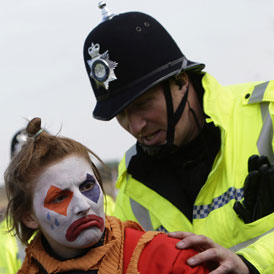Prosecutor facing action over undercover policeman
A prosecutor faces disciplinary action after an inquiry uncovers a series of failures over the use of an undercover police officer. DPP Keir Starmer tells Channel 4 News the problem is not “systemic”.

Retired high court judge Sir Christopher Rose found that crown prosecutor Ian Cunningham failed to establish the activities of the officer during a collapsed case against environmental activists accused of plotting to shut Ratcliffe-on-Soar power station.
Sir Christopher said more should have been done to to establish the extent of Pc Mark Kennedy’s undercover involvement during the investigation. His inquiry found that senior lawyers and officers were to blame for failures to declare surveillance evidence during attempts to convict protesters.
Director of Public Prosecutions Keir Starmer QC said he took the findings “very seriously indeed” as he ordered disciplinary proceedings against Mr Cunningham. Mr Starmer has written to the Attorney General expressing concern about communication between prosecutors and police.
Asked by Channel 4 News if there were other cases that should be investigated, he said: “If Sir Christopher Rose had found systemic problems, then I would quite accept perhaps a retrospective look at all the cases. But he didn’t, he found individual failings.
I’m in no way saying I won’t look at other cases. Keir Starmer, DPP
“Whenever people raise concerns with me …. I will always look at those cases. That is why we looked at this case. I don’t shut my mind to that. I never have shut my mind to that. So I’m in no way saying I won’t look at other cases. What I’m saying is I think it would be better use of our time and resources to look when an issue is raised, rather than look back at everything, when Sir Christopher said there’s no systemic problem.”
Undercover police
In his letter to the Attorney General, Mr Starmer said: “To avoid any recurrence of similar issues, I propose that a police/CPS memorandum of understanding be prepared that makes it absolutely clear that in any future cases, the full extent of any authorisation and activity of an undercover officer must be shared between the police and the CPS as soon as a criminal prosecution is contemplated,” he said in his letter.
Sir Christopher said Mr Cunningham “relied too heavily on what he was told by police in relation to the undercover officer and failed to probe what material there was in relation to the undercover officer’s activities”.
But he said that although there were individual failings, “at no stage of the prosecution was there a deliberate, still less dishonest, withholding of information”.
‘Mark Stone’
The case sparked widespread concern after it emerged that Mr Kennedy, a former Scotland Yard officer, spent years posing as an activist known as Mark Stone.
Six protesters accused of planning to invade the power station in Nottingham, the second largest in the UK, claimed prosecutors dropped charges against them after Mr Kennedy offered to give evidence on their behalf.
Convictions quashed
Twenty people have had their convictions quashed after previously being found guilty of conspiracy to commit aggravated trespass.
Disclosures were not made during the case because of “failures, over many months and at more than one level, by the police and the CPS”, Sir Christopher said.
“The general picture of what occurred is that, at several stages, there was a failure between police officers and between the police and CPS to pass on such information.”
According to the report, Mr Cunningham “failed to ask pertinent questions”.The consequence was that charges were laid which would not have been and the defence were later prejudiced because potentially helpful material never reached them, as it should have done, long before the trial of the justifiers”.
Mr Starmer, who asked Sir Christopher to carry out the inquiry, said the events “cannot be allowed to happen again”, adding: “It has to be seen as a watershed in the way cases involving undercover officers are dealt with.”